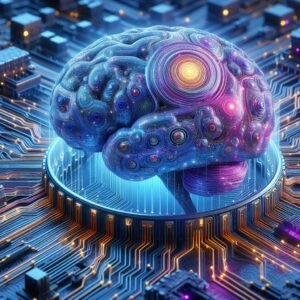The Rise of Quantum Computing: How It Will Revolutionize Technology

In the realm of emerging technologies, few topics evoke as much excitement and intrigue as quantum computing. Once confined to the fringes of scientific theory, quantum computing is now making its way into mainstream discussions, and the implications are immense. Traditional computers, based on classical bits, have served humanity for decades, but quantum computing—powered by qubits—promises to push the boundaries of what’s possible in everything from cryptography and drug discovery to artificial intelligence (AI) and financial modeling.
Quantum computing represents more than just a faster way to process information; it symbolizes a complete shift in how we approach complex problems. In this article, we’ll explore what quantum computing is, how it works, its current applications, challenges, and the industries it will revolutionize.
What Is Quantum Computing?
To understand quantum computing, we first need to dive into quantum mechanics—the field of physics that governs the behavior of the tiniest particles, like electrons and photons. Classical computers operate on bits, which can either be in a state of 0 or 1. Quantum computers, however, use qubits, which, thanks to a principle called superposition, can be in multiple states simultaneously. This allows quantum computers to process an exponentially greater amount of data compared to classical computers.
In addition to superposition, quantum computers leverage another key quantum phenomenon: entanglement. When qubits become entangled, the state of one qubit is directly linked to the state of another, no matter the physical distance between them. This entanglement allows quantum computers to perform complex calculations far faster than classical systems, leading to unprecedented advancements in computation.
Current Applications of Quantum Computing
Though quantum computing is still in its early stages, its potential is already being realized in several key areas. Some of the most exciting current applications include cryptography, drug discovery, and artificial intelligence.
1. Quantum Computing in Cryptography
Perhaps the most well-known application of quantum computing is in cryptography. Classical encryption techniques, such as RSA, rely on the difficulty of factoring large numbers—a task that is computationally infeasible for classical computers. However, quantum computers, using algorithms like Shor’s algorithm, can factor large numbers exponentially faster. This presents a serious threat to current encryption standards, as quantum computers could, in theory, break the encryption protocols that protect everything from financial transactions to government secrets.
This is why post-quantum cryptography has become a growing field of research. Scientists are racing to develop new encryption techniques that will be resistant to the power of quantum computers. The challenge is immense, but so are the rewards: secure communication, financial transactions, and data storage in a post-quantum world will depend on it.
2. Revolutionizing Drug Discovery
Quantum computing’s potential to revolutionize drug discovery is another exciting area of development. In drug discovery, researchers need to simulate the interactions of molecules to understand how different compounds will behave. Classical computers struggle to simulate these interactions accurately, particularly for large molecules.
Quantum computers, however, can process these complex molecular interactions in a fraction of the time, allowing researchers to identify promising compounds more quickly. This could dramatically shorten the time it takes to develop new drugs, leading to faster breakthroughs in treatments for diseases like cancer and Alzheimer’s. Additionally, quantum simulations could lead to the development of precision medicine, where treatments are tailored to a patient’s genetic profile, resulting in more effective and personalized healthcare.
3. AI and Machine Learning on Quantum Systems
Artificial intelligence and machine learning are revolutionizing countless industries, from healthcare to finance to autonomous vehicles. However, current AI models require enormous computational power to train and run, and even the most powerful supercomputers can struggle to handle large datasets in real-time.
Quantum computing can change that. Thanks to its ability to process vast amounts of data simultaneously, quantum computers could enable new types of AI algorithms that are faster, more efficient, and capable of tackling more complex problems than classical computers. This could lead to major advancements in areas such as natural language processing, image recognition, and autonomous systems.
Industries Poised for Quantum Disruption
Quantum computing is set to transform several key industries. Here are some of the most prominent sectors that will be disrupted by quantum technology.
1. Finance and Investment
The finance industry has always been a fast adopter of cutting-edge technology, and quantum computing is no exception. Quantum computers can perform complex calculations that would take classical computers years to complete, such as predicting stock market trends, optimizing investment portfolios, and managing risk.
One of the most promising applications is quantum optimization, where quantum algorithms are used to find the best solution to a problem from a vast set of possibilities. For example, quantum computers could help financial institutions optimize their investment strategies by analyzing massive amounts of data in real-time. They could also improve fraud detection by processing and identifying patterns in transactions much faster than classical systems.
2. Logistics and Supply Chain Management
In the logistics industry, optimizing routes and supply chains is crucial for reducing costs and improving efficiency. Classical computers can only handle a limited number of variables when calculating optimal routes, but quantum computers can process exponentially more data points, allowing them to identify the best possible solutions in real-time.
This has major implications for companies like Amazon, UPS, and FedEx, which rely on efficient supply chains to deliver goods to customers. Quantum algorithms could optimize everything from delivery routes to warehouse management, resulting in faster deliveries and lower operational costs.
3. Climate Science and Sustainability
Another area where quantum computing could have a significant impact is climate science. Accurately predicting climate patterns is one of the most complex problems in science, as it involves modeling the behavior of countless variables, from ocean temperatures to atmospheric conditions. Current models, while advanced, are limited by the computational power of classical systems.
Quantum computers, however, can handle these massive datasets with ease, potentially leading to more accurate climate models. This could help scientists better understand how the climate is changing and how to mitigate the effects of climate change. In addition, quantum computing could be used to optimize renewable energy systems and develop new technologies for reducing carbon emissions.
Challenges of Quantum Computing
While quantum computing holds immense promise, there are several challenges that must be overcome before it can become a mainstream technology.
1. Hardware Limitations
Building a stable, scalable quantum computer is no small feat. Qubits are incredibly sensitive to their environment, and even slight changes in temperature or electromagnetic fields can cause them to lose their quantum state—this is known as quantum decoherence. Scientists are working on developing better materials and techniques to stabilize qubits, but it remains a significant challenge.
2. Error Correction
Quantum computers are prone to errors due to noise in the system, which can lead to incorrect results. Quantum error correction is a field of research focused on developing methods to detect and fix these errors, but it is still in its infancy. For quantum computing to be viable on a large scale, robust error correction techniques will need to be developed.
3. Cost and Scalability
Quantum computers are incredibly expensive to build and maintain. The technology is still in the research and development phase, and building a commercially viable quantum computer is likely to take many more years. Additionally, scaling quantum computers to the point where they can handle real-world problems is a major hurdle that has yet to be overcome.
The Future of Quantum Computing
Despite these challenges, the future of quantum computing looks incredibly bright. Major tech companies like Google, IBM, and Microsoft are investing heavily in quantum research, and breakthroughs are being made at a rapid pace. In 2019, Google claimed to have achieved quantum supremacy—the point at which a quantum computer can perform a calculation that would be impossible for a classical computer. While the claim is still debated, it marks an important milestone in the development of quantum technology.
Looking ahead, it’s clear that quantum computing will play a major role in shaping the future of technology. From revolutionizing industries like finance and healthcare to solving complex global challenges like climate change, the potential of quantum computing is limitless.
Conclusion
Quantum computing is not just an incremental improvement over classical computers; it represents a complete paradigm shift in how we process and analyze information. While the technology is still in its infancy, its potential applications are vast and far-reaching. From cryptography to drug discovery, from financial modeling to climate science, quantum computing promises to revolutionize industries and solve some of the most complex problems facing humanity today.
As the technology continues to evolve and overcome its current limitations, we can expect to see quantum computers become an integral part of our technological landscape. The future is quantum, and it’s coming faster than we think.







